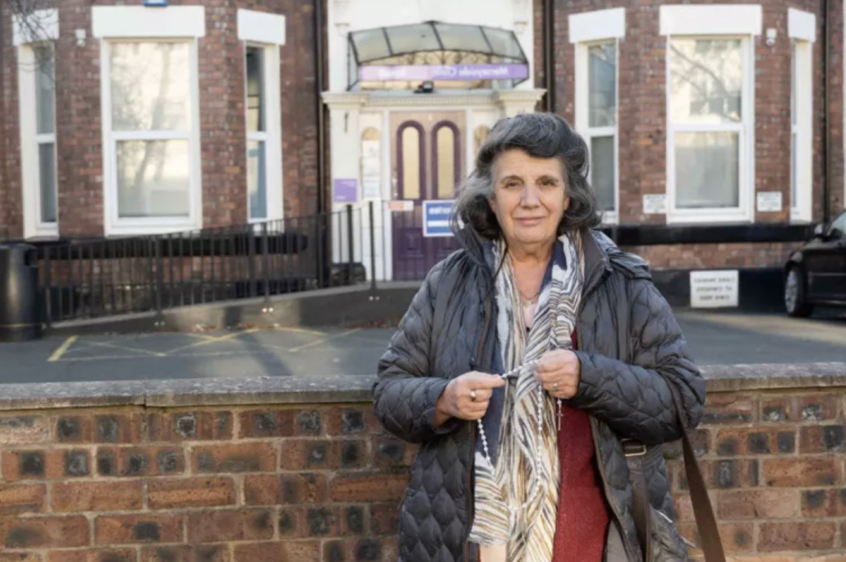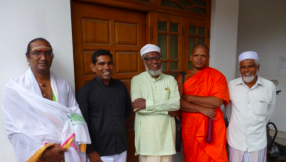
(CP) Religious freedom advocates are celebrating after police dropped charges against a 76-year-old British woman arrested, detained and fined for engaging in silent prayer outside an abortion clinic.
ADF UK, a chapter of the religious liberty legal nonprofit Alliance Defending Freedom, announced in a statement Monday that Merseyside Police Department dropped the charges against Rosa Lalor for silently praying outside an abortion clinic during the coronavirus pandemic in February 2021.
The fine levied against Lalor has also been dropped.
Lalor's legal troubles began on Feb. 24, 2021, when a law enforcement officer inquired why she was outdoors during the lockdowns implemented to contain the coronavirus. When she responded that she was "walking and praying," the officer told her she did not have a "reasonable" excuse to be doing so because she was not at a church.
A case summary compiled by ADF notes that "during the lockdown in 2021, Rosa was always careful to follow the rules." Specifically, "she took a walk most days, as was permitted, and even wore a mask, which wasn't required, in order to take extra precautions."
"I'm delighted that the prosecution has finally dropped this charge after a long and exhausting battle for justice," Lalor said in a statement. "I took this challenge forward with support from ADF UK to show that we do all have a fundamental right to pray – not least pray as I did, in the privacy of my own mind."
"It was wrong for the police officer to tell me that I could not pray in a public street," she added. "It's important for officers to respect basic religious freedom, and improve their understanding of how that right manifests, in order to maintain a truly tolerant society."
ADF UK argued that Article 9 of the European Convention on Human Rights gives Lalor the right to pray outside the abortion clinic.
Article 9 declares: "Everyone has the right to freedom of thought, conscience and religion; this right includes freedom to change his religion or belief and freedom, either alone or in community with others and in public or private, to manifest his religion or belief, in worship, teaching, practice and observance."
Jeremiah Igunnubole, legal counsel for ADF UK who worked on Lalor's case, said it is "deeply regrettable that this law-abiding woman was subjected to distressing, drawn-out criminal proceedings in the first place, no doubt due to her pro-life stance."
"This follows a worrying trend in law enforcement where individuals are routinely arrested because their views are considered to be controversial or offensive," he said in a statement.
Igunnubole said Lalor's story shows the "urgent need for the upskilling of police officers across the country to ensure that they have a proper grasp of the right to freedom of expression and religion as it relates to public order."
"Law, policy, and training procedures must be improved to restore the public's confidence in policing and stem the trend of unjust arrests," Igunnubole said. "Officers should be prioritising real crimes that concern ordinary people rather than being agents of cancel-culture."
Robert Colquhoun, the international director of the pro-life organization 40 Days for Life, which holds prayer rallies outside abortion clinics, called it "an important win because authorities cannot simply decide to censor prayer on the street."
"We are committed to engaging in prayer because we believe that women and babies deserve far better than abortion, and that we can find solutions to support both lives in a pregnancy," Colquhoun said.
"We are always delighted to point women to charities and services where they can receive support to continue their pregnancy, should they want it. We hope that Rosa's story sends a clear message that in a democracy, there is space for freedom of religion, freedom of assembly, freedom of speech, and freedom of thought – and that censorship is a disservice to everyone."
ADF UK is concerned with a Northern Ireland law that bans protesters from "influencing" women seeking to enter abortion clinics by requiring that they remain at least 100 meters, or nearly 300 feet, away from the facilities. The U.K. Supreme Court is slated to examine the law later this week as other cities in England, including Liverpool and Bournemouth, consider implementing similar measures.
ADF UK Communications Director Lois McClatchie warned of the impact such laws could have on pro-life protesters like Lalor.
"The criminalisation of any kind of 'influencing' is so broad that it could reduce the threshold of criminality to an impermissibly low level," McClatchie said. "We know from a Home Office Review into the situation that instances of harassment outside of abortion facilities are rare, and when it happens, police already have powers to stop it."
"Buffer zones introduce a blanket ban on all activity, including offering meaningful charitable help and support to women where they need it most," she contended.
© The Christian Post













